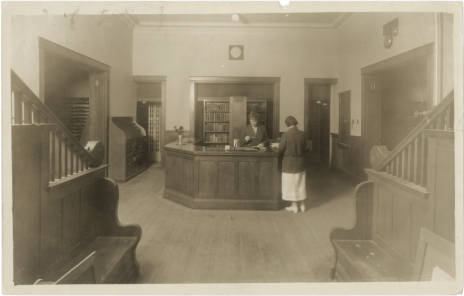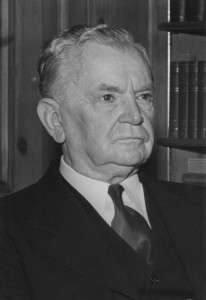Throughout the first seven decades of its existence, the institution now known as UNCG grappled with a number of questions regarding facility use by students from neighboring colleges, particularly the nearby African-American institutions such as North Carolina A&T and Bennett College.
As early as February 1929, administrators were discussing use of the Library by students from A&T. Then Vice President (and later Chancellor) Walter Clinton Jackson wrote College President Julius Foust on February 15, 1929, requesting that an A&T student be allowed to borrow books from the College Library. Jackson wrote, “it seems to me rather incongruous that we should refuse a little courtesy of this kind to a neighbor institution, even though a negro institution. It is a very small matter, in a way, but it has large consequences so far as the Negroes are concerned.”
Foust agreed to discuss the matter with the College Librarian and “do anything we can to aid these students.” He quickly added, however, that Jackson should be acutely award “that certain embarrassments may arise in our attempt to do what they request” and that he “doubt[ed] the wisdom of permitting negro students to take the books out of our library.” While he agreed to consider the idea, Foust added that he would ask the Librarian to consult with Dr. Anna Gove, the student health coordinator, to learn more “about the danger that may arise from disease if these students are permitted to take the books and use them when our students must use them when they are returned to the library.”
Jackson’s decision to support the use of the WC Library by African-American students ran counter to the Jim Crow laws that were prevalent across North Carolina at the time. Jackson, however, was well known as a champion of racial equality. He arrived at the institution then known as State Normal in 1909 to lead the history department. A native of Georgia, he studied at Mercer University and spoke frequently on the topic of race relations in American history. Although he was forced to work within the framework of the segregated South, he served as chairman of local, state, and southern regional Commissions on Interracial Cooperation. From 1938 to 1953, he served as chairman of the Board of Trustees at Bennett College.
Throughout his sixteen-year tenure as Woman’s College chancellor (1934-1950), Jackson opened many venues for progress and collaboration between WC and its neighboring educational institutions, including those that were African American. In a June 17, 1935, letter to Charlotte Hawkins Brown, he expressed dismay that WC would not be able to openly welcome students from Brown’s Palmer Institute, a school for African Americans in Sedalia, North Carolina, just outside of Greensboro. After Brown declined to bring her students to a music performance at the WC due to the segregated seating requirements, Jackson wrote, “I hope the time will speedily come when difficulties which confront us may be more easily resolved.”
State laws and regulations, however, did not support open sharing of resources between WC and its African-American neighbor institutions. “Separate but equal” policies resulted in the segregation of public schools, public spaces, transportation, restrooms, restaurants, and drinking fountains. Since 1901, North Carolina state law had explicitly required separate facilities for the consumption of library materials by white and black citizens. While a number of prominent North Carolinians, including Governor W. Kerr Scott (1949-1953), believed in extended some degree of civil liberties to African Americans, the general consensus across the state favored the continuation of segregationist policies.
Jackson’s willingness to push these boundaries and search for concessions whenever possible led to him being recognized as a “pioneer in the field of better race relations” when he received an honorary doctorate from Bennett in 1949. While Jackson was no longer Chancellor when the WC was officially desegregated in 1956, he stood as an early leader in creating a more open and accepting campus.
Article by Erin Lawrimore

